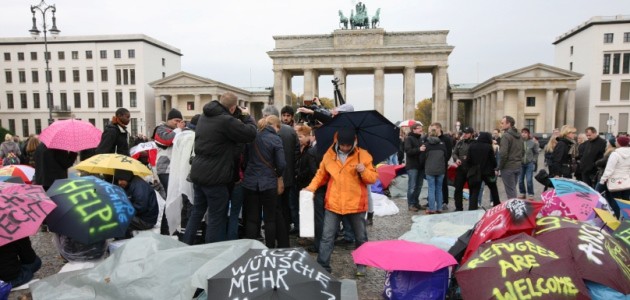On 4 May 2016, the Core Course on Security Policy met Fritz Felgentreu, Member of the German Parliament, and migration expert Professor Karl-Heinz Meier-Braun to discuss the political challenges of the current refugee crisis.

Refugees protest during a hunger strike in front of the Brandenburger Tor in 2013.
Picture: PanchoS/wikimedia commons/CC BY 2.0
Could refugee politics tear apart our society? That question was at the center of the Core Course on Security Policy when the participants met Social Democrat Fritz Felgentreu, Member of the German Parliament, and Professor Karl-Heinz Maier-Braun, who is a migration expert and author. As a representative of the Berlin-Neukölln district, Felgentreu brought 20 years of experience in a migration-shaped neighborhood into the discussion. Meyer-Braun has been working on integration and migration for 40 years, including appointments as integration commissioner of the Südwestrundfunk public broadcasting company and as board member of the Council on Migration.
Refugee politics are the most pressing issue
The committed discussion soon showed that refugee politics are the most pressing issue at the moment. That was hardly surprising, as the fears and concerns surrounding the large number of refugees point to highly emotional themes like home, alienation, and loss of identity. Hence during the discussion it became clear that the refugee subject constitutes an extremely contentious issue with regard to societal cohesion in Germany. In fact, our society is full of potential cleavages: young and old, men and women, families and singles, East and West, and different religious beliefs. However none of these issues seems to be as hotly debated as immigration background, integration, and national identity.
Preserving societal cohesion is currently a particularly difficult matter for the four million German Muslims. A widespread attitude, including voices from a governing party, that their religion did “not belong to Germany” renders it hard for them to feel integrated and as a part of this society. This could foster radicalization.
Having experienced the refugee crisis since September 2015, large parts of the population have developed serious doubts towards the government’s problem-solving competence. The political frustration appears to be a direct result of the experienced lack of control and of a perceived incapacity to enforce law and public order. Maybe the central question in refugee politics is not so much one of “if” but one of “how”.
The case for a shift from crisis mode to strategic governance
Two aspects clearly shaped the discussion about possible solutions: On the one hand, the political realm, but also other relevant social groups including business, sports, churches, or media should address migration and integration issues. As these subjects are currently dominated by anxiety and controversy, a broad and transparent debate should be initiated on how we want to live together as a society. This debate should be based on substantially more facts and data, for example with regard to the root causes for escape and migration as well as foreseeable migration movements in the future. Germany’s long history of immigration and integration and the lessons learned from it would have to be included, too.
On the other hand, politics should shift from the crisis mode to strategy-based governance in order to create trust among the people that, in Chancellor Angela Merkel's words, “we’ll make it” and, especially, with regard to “how” we will make it. Looking at the integration law, the EU-Turkey agreement, treaties with other emigration and transit states, and at the European measures towards a common asylum system and to reinstate the Schengen Area, approaches to such a strategy are discernable.
However, at the moment it appears questionable whether this might be enough to regain the confidence in enforcement capabilities that has been lost – “bringing back the sense of security to the people” is critical, as one course participant said. A good indicator for governmental success in this matter could be the results of the “Alternative für Deutschland” party (AfD) at the next elections.
Author: Andrea Muck
